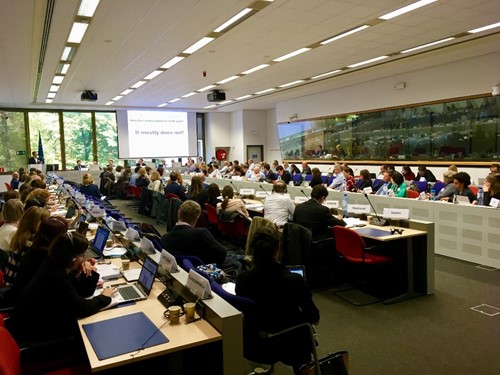The European Commission’s Directorate General for Health and Food Safety (DG SANTE) has officially started the evaluation process for the EU’s food contact materials legislation.
Member states, trade associations, NGOs, consultants and other specialists shared views at an inaugural workshop, hosted by DG SANTE on 24 September in Brussels.
Since basic provisions set out 42 years ago, the EU legislation has never been evaluated. The FCM Regulation of 2004 describes the general principles of chemical safety and provides further powers to enact specific EU measures for specified materials and articles that are currently not harmonised.
Sabine Juelicher, Director of DG SANTE’s Food and feed safety, Innovation (unit E), set the frame for the evaluation, stating that the “FCM scope is wide and actually quite challenging”. The current EU FCM regulation dates back more than 40 years and has two main objectives: (1) to protect public health from harmful chemicals originating from FCMs and (2) to ensure the functioning of the free EU market. The purpose of the evaluation exercise is to assess how the existing legislation is performing in meeting its two main objectives. This step will serve as basis for reflections on what needs to be done to improve legislation, “if anything”, as Sabine Juelicher stated.
Jonathan Briggs is leading the evaluation process within DG SANTE’s unit E2, Food processing technologies and novel foods. A roadmap for the evaluation was published by DG SANTE in November 2017, (FEPF participated to the consultation) and stakeholder feedback on the roadmap was received . Jonathan Briggs pointed out that some issues raised by stakeholders are known, for example the “non-harmonised” FCMs for which EU-wide specific measures are absent. He also stated the need to assess coherence with other EU legislation.
Addressing the evaluation process and study, representatives of Ecorys, the contractor running the evaluation, described the five evaluation criteria according to which the FCM regulation will be assessed: Effectiveness (i.e. does the regulation deliver as expected), Efficiency (i.e. cost vs benefits), Relevance (i.e. addressing the needs and problems), Coherence (i.e. overlaps with or discrepancies to other EU regulations), and EU added value (i.e. compared to EU not intervening). A subset of pre-defined questions will be asked for each criterion, and sub-topics for the evaluation will be set.
It was stressed that input from all stakeholders is welcome. Ecorys said it will contact stakeholders and ask them to join focus groups, give expert interviews and respond to surveys from November. It will also set up a SME panel and start an open public consultation early next year.
Details on the evaluation process were shared by Michael Lasch of DG SANTE’s unit A1, Better regulation. The evaluation will be carried out using Better Regulation Guidelines. Michael Lasch stated that “stakeholder input is at the core” of this process, where a fitness check will be carried out to assess how the regulation performs. The timeframe for the evaluation is twelve months, starting in September 2018. Publication of the final report is foreseen for October 2019, and a staff working document will be prepared at the beginning of 2020.
For more see the European Commission's website here.
